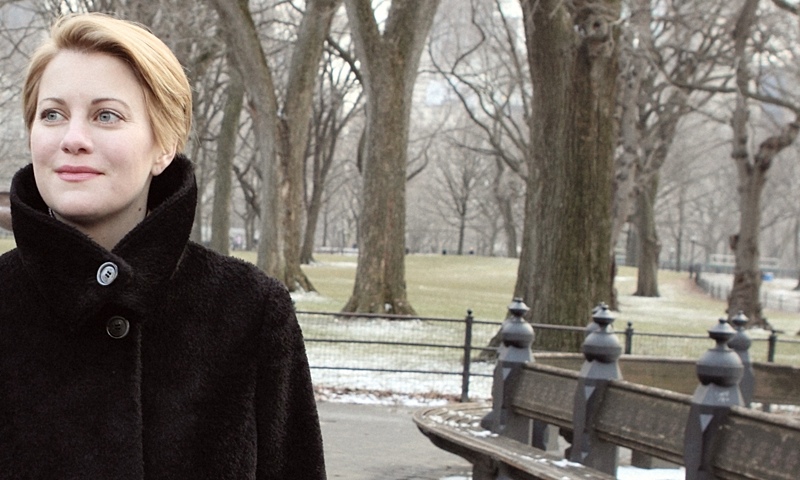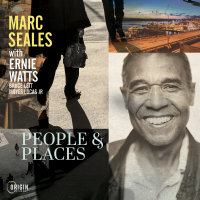Home » Jazz Articles » Interview » Maud Hixson: Studying Scores and Moving Forward
Maud Hixson: Studying Scores and Moving Forward

That's what's exciting about any journey--you can plan it out, but taking the trip is never the same as looking at the map. There is so much to discover beyond just listening to other singers' recordings of a song.
—Maud Hixson
Maud Hixson
vocals
Doris Day
vocals1922 - 2019
Ruth Etting
b.1897
Blossom Dearie
piano and vocals1926 - 2009

Ella Fitzgerald
vocals1917 - 1996
Hixson began performing professionally in 2002 and quit her job as an airline French interpreter in 2003, committing to singing full-time. The strong following she began to develop in the Twin Cities led to increasing national attention, her first New York cabaret show in 2008, and her theatrical debut at Minneapolis' Guthrie Theater in 2010. Fabled New York composer Michael Leonard chose her as the vocalist heading an all-star combo for a definitive CD last year.
Singer/songwriter

Amanda McBroom
vocals
Peggy Lee
vocals1920 - 2002
All About Jazz: First, how do you feel about the state of vocal music today—the material, the audience, the general direction of the music?
Maud Hixson: The material, I think, reflects the values of today's society, as it always has, the audience is bigger than ever, and the general direction is focused on innovation.
AAJ: Are you concerned about how vocal music is often poorly identified now? When I see the work of serious vocalists listed as "Middle Of The Road" or "Easy Listening" music, I cringe. Do these category conflations seem to reflect a reduced appreciation of the sophistication of the compositions you and your peers perform?
MH: I think of "middle-of-the-road" and "easy listening" as terms that were invented for radio audiences in the last decades of the 20th century. I think these kinds of labels, invented to help the consumer, will keep changing as the ways we consume music continue to change. And there isn't much sophistication in a label.
AAJ: I won't ask the obvious question about whether the TV singing competition shows have lowered and coarsened general standards for vocals, but do you see any resurgence for artistic jazz vocals coinciding with the apparent demise of that televised hype?
MH: I've never watched any of those shows, as my career really started around the same time they first appeared, so I would be working in clubs when they were on. I wouldn't think that the audiences interested in that type of reality/contest show would become jazz audiences once those shows end.
AAJ: You work out of the Twin Cities. I know there's been a reduction in performing venues for jazz there (as most everywhere else). How are you working to maintain and expand your audience in an era when the economic model of clubs seems so tough?
MH: Clubs haven't provided a living for musicians for quite a few years now, so my focus is on concert and cabaret venues, with some private work on the side.
AAJ: Your most recent CD, Don't Let A Good Thing Get Away, collected compositions of Michael Leonard, whose work had long been well respected in the music business but was not generally well known in the mainstream. What would you say about this composer and why you felt it was important to make this recording?
MH: I wanted to have the experience of working directly with a living composer, while surveying their entire output, and learn as much as I could about how they had done their work before I started on my job as an interpreter. I also wanted to learn the life story of each song, how it was born, how it grew and changed, how it was used, how it was performed in its lifetime. Michael Leonard was an ideal choice to work with because he had written songs with several different lyricists for many different settings, after the body of the Great American Songbook had been written. I also felt freer while recording these songs, knowing that my interpretation would be more likely to be heard on its own merits rather than compared with a famous version from the past.
AAJ: Would you outline your major musical influences?
MH: I have an enormous amount of influences, as music has always been like food to me. I have a couple of guiding voices, however, that have stayed with me since I became interested in singing as a child. The one I hold closest to my heart is

Judy Garland
vocals1922 - 1969

Frank Sinatra
vocals1915 - 1998
AAJ: You do a lot of primary research in choosing and performing songs. Have you very often been surprised or inspired by finding unexpected elements in scores or background material?
MH: That's what's exciting about any journey—you can plan it out, but taking the trip is never the same as looking at the map. There is so much to discover beyond just listening to other singers' recordings of a song. I always start with hunting down the original sheet music, and there's always at least one surprise there. I've often been inspired by knowing the background of a song as well, as you never know what detail will help you tell the story when you sing it.
AAJ: How different do you feel your performing is today from, say, ten years ago?
MH: I wouldn't say I was a performer ten years ago—I was still struggling to be consistent technically, and I hadn't yet developed good habits around preparing material for an audience. So I was still mostly singing for myself. Now I can instantly connect with an audience and tell the story the way I want to tell it.
AAJ: Which composers of quality songs do you see as remaining under- appreciated? Conversely, are there any composers you think vocalists rely on too much or whose songs have become somewhat tiresome?
MH: There are too many to mention, and many of them didn't write enough songs to become household names. I don't think a great song can ever become tiresome, but I could understand listeners getting sick of hearing a standard that keeps being reinterpreted in uninspiring ways.
AAJ: Who are your favorite contemporary singers? Which ones do you think especially deserve a larger audience?
MH:

Lorraine Feather
vocalsb.1948

James Taylor
guitar and vocalsb.1948
AAJ: Another question about the category at large: I wonder what, if anything, you think of the distinction sometimes made between "jazz singing" and "pop singing." I've read some critics call singers like

Johnny Hartman
vocals1923 - 1983
MH: I think

Mel Torme
vocals1925 - 1999
AAJ: Follow-up to that last question: With your love of research, I'd guess you've heard that truncated 1958 outtake in which Sinatra starts to lay down

Billy Strayhorn
piano1915 - 1967
MH: In that outtake, when he starts the refrain, his delivery becomes stilted as his singing of the melody seems to clash with what he hears in the arrangement, so he stops the take and announces that not only is it a difficult melody, but the arranger,

Nelson Riddle
arranger1921 - 1985
AAJ: There's another fascinating example of that process on YouTube now: two earlier takes of "The Summer Wind." They're both quite good, and you can hear slight but significant improvs in phrasing and melody leading to the great final version. Having heard your Leonard CD and "Love's Refrain," I'd guess you've developed your own version of this process.
MH: (After pausing to review "SW" outtakes) This was fascinating to listen to. The tempo finally settles into its sweet spot, and Sinatra's interpretation gains momentum as his choices start indicating the overall feeling of the arrangement, as I imagine it affected him with that great band lending its powerful slow swing. My process I liken to running down an unpaved path, barefoot. Each time you do it, your feet remember where the rocks and tree roots are and you become more agile each time you negotiate them. Finally you can run the whole length of the path with style, gracefully, and not run out of breath.
AAJ: Not many singers today perform and record with accompaniment ranging from piano only to a full big band like the Wolverines. How did you develop that range?
MH: By listening and then getting out and doing it. The learning curve is a bit steeper with a big band—if you stumble with a pianist, you may scrape your elbow, but if you do it with a big band, you get run over by a freight train.
AAJ: If you care to, I'd be interested in hearing about the best and worst gigs you've ever worked.
MH: I'm at the point now where there are several gigs in each category, but here are a couple that are particularly meaningful to me. Probably the worst (certainly for the musicians) was a gig where I sang the first line of a song and then realized I couldn't remember anything after that. I started laughing hysterically and couldn't stop. One of the very best was the concert I did with Sir Richard Rodney Bennett in New York in 2012. He was a brilliant composer and pianist and we had such fun. He had taken notice of me because he'd heard my recording of one of his favorite songs "I'm Way Ahead Of The Game," by

Johnny Mercer
composer / conductor1909 - 1976
Tags
Maud Hixson
Interview
David Bittinger
United States
Wisconsin
Milwaukee
Doris Day
Ruth Etting
Blossom Dearie
Ella Fitzgerald
Amanda McBroom
Peggy Lee
Judy Garland
frank sinatra
Lorraine Feather
James Taylor
Johnny Hartman
Mel Torme
Billy Strayhorn
Nelson Riddle
Johnny Mercer
Comments
PREVIOUS / NEXT
Support All About Jazz
 All About Jazz has been a pillar of jazz since 1995, championing it as an art form and, more importantly, supporting the musicians who make it. Our enduring commitment has made "AAJ" one of the most culturally important websites of its kind, read by hundreds of thousands of fans, musicians and industry figures every month.
All About Jazz has been a pillar of jazz since 1995, championing it as an art form and, more importantly, supporting the musicians who make it. Our enduring commitment has made "AAJ" one of the most culturally important websites of its kind, read by hundreds of thousands of fans, musicians and industry figures every month.
Go Ad Free!
To maintain our platform while developing new means to foster jazz discovery and connectivity, we need your help. You can become a sustaining member for as little as $20 and in return, we'll immediately hide those pesky ads plus provide access to future articles for a full year. This winning combination vastly improves your AAJ experience and allow us to vigorously build on the pioneering work we first started in 1995. So enjoy an ad-free AAJ experience and help us remain a positive beacon for jazz by making a donation today.

Milwaukee
Concert Guide | Venue Guide | Local Businesses
| More...






 Buy Now
Buy Now






















